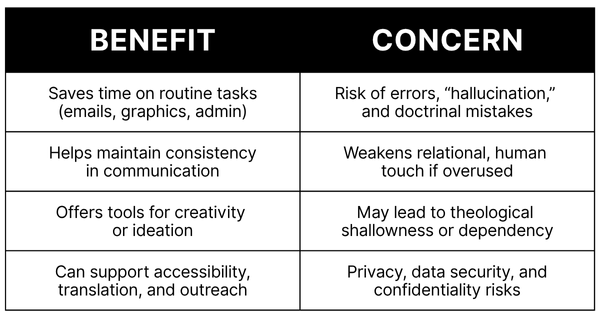Should My Church Use AI?
By Analiese Rivera

The Question Before the Tool
Before we ask “Should we use AI?”, a healthier question is: “What is God calling us to do, and what tools will help us stay faithful to that calling?” AI is not a silver bullet. It’s a powerful new tool—one that can help, but also distract, distort, or damage. So our starting point is always mission, discipleship, and shepherding.
In fact, a recent Ministry Watch report shows 45 % of church leaders say they now use AI in some capacity (though often for content, graphics, and communication rather than deep theology).
What AI Even Means in Church Context
When we talk about AI here, we usually mean generative AI or “large language models” like ChatGPT, which can generate text, suggest ideas, analyze inputs, etc. In a church setting, it might help with tasks like:
- Drafting or brainstorming sermon outlines
- Generating content for emails, social media, and newsletters
- Responding to common website questions (e.g., “When’s service?”)
- Helping with translation or accessibility
- Automating routine admin tasks (scheduling, reminders)
These are not exotic uses—they’re already becoming mainstream in many ministries. However, that data also shows that many pastors still prefer to write sermons themselves rather than fully outsourcing them to AI.
Four Perspectives to Test
To decide if AI is right for your church, it helps to run it through these four lenses:
- Mission & Identity
What defines your church? Churchs are often rooted in genuine relationships and cultivating spiritual growth, technology should strengthen those values, not take their place. If AI shifts your identity (e.g., more “tech-forward” than “community-forward”), that’s a warning sign. - Stewardship
AI can multiply your capacity. If you’re drowning in admin, follow-up, and content creation, then AI might free you up to focus on human work: discipleship, pastoral care, and presence. But it demands wise investment—training, oversight, and quality control. - Risk & Accountability
AI can hallucinate (i.e., generate errors), misinterpret nuance, propagate bias, or leak private information. In a church context, those risks carry spiritual weight. If AI misstates doctrine or mishandles pastoral questions, the fallout is serious. Churches must be accountable for what their systems do. - Formation vs. Convenience
Ministry is often transformative because of the struggle, the reflection, the wrestle. If we rely too heavily on AI for sermon preparation or theological reflection, we may miss growth opportunities for pastors or leaders. Using AI to assist is different from using it to replace spiritual and intellectual labor.
Pros & Cons at a Glance:
Many believe AI is a neutral tool whose impact depends on how it’s used; yet, there is a shared agreement that spiritual responsibilities, such as sermon preparation and pastoral care, should remain in human hands.
Guidelines for Smart Use
If your church leans toward “yes, with caution,” here are guardrails you might adopt:
- Clarify what AI will not do
For example, AI will never replace pastoral care, counseling, or drafting sermons. - Always vet AI output carefully
Never publish or preach AI-generated content without human review, especially on theological or pastoral matters. - Be transparent with your congregation
Let people know when they’re interacting with an AI (chatbot, auto-response) vs. a human. - Start small & pilot carefully
Try AI for non-spiritual tasks first (such as scheduling, graphics, and reminders), see what happens, learn, and adapt. - Set ethics, privacy, and data rules
Define who controls the data, how conversations are stored (or not), and who’s responsible when something goes wrong. - Cultivate spiritual disciplines alongside the tech
Encourage pastors and leaders to keep wrestling deeply with Scripture, prayer, discourse—the human work that AI can’t replace. - Reevaluate regularly
Check in on impact, surprises, and unintended consequences. Be prepared to scale back or adjust your course.
Final Thoughts
“Should my church use AI?” is not yes or no—it’s which AI, to what end, with what limits. The better question is: Will this tool help us love God, love people, and grow disciples?
If you lean toward experimentation, do so humbly, cautiously, and with strong guardrails in place. If you lean against, don’t fear technology—but stay committed to the human work that can’t be automated.
Sources:
Christian Today
The Malphurs Group
Answers in Genesis
Chron
The Master's Seminary Blog

